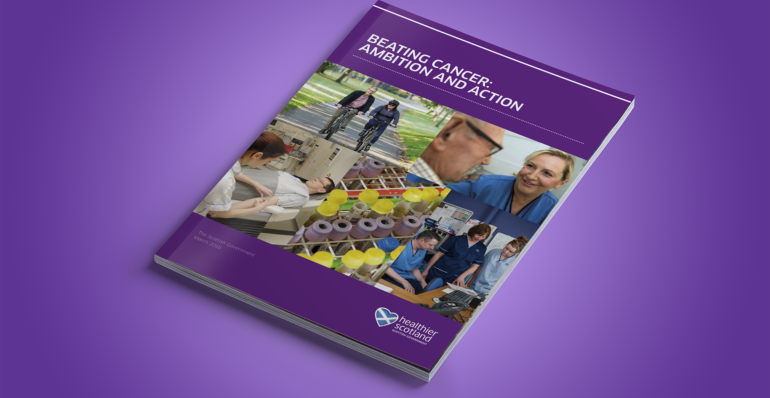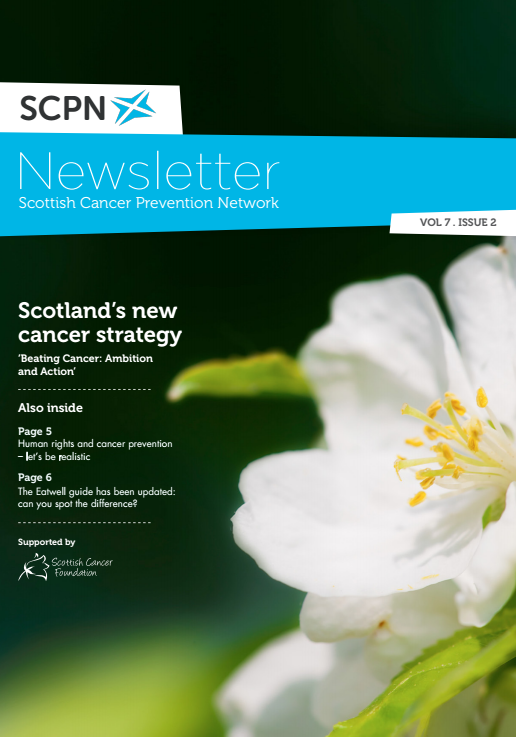
Scotland’s new cancer strategy ‘Beating Cancer: Ambition and Action’

27 Apr 16 |
So what do people think of the new cancer strategy?
Annie S. Anderson
Co-Director, Scottish Cancer Prevention Network
The long awaited cancer strategy from Scottish Government has a clear focus on health inequalities and the need for person centred care. In the foreword by the Cabinet Secretary, prevention of the disease does get a note, highlighting “the further plans being developed to reduce the risk of people getting cancer in the first place”. Further mention is then made of “building on our extensive prevention programme” and that’s where I started to get excited.
The strategy does set out to be ambitious and, of the 7 targets for assessing success, I feel sure that the most challenging will be “a reduction in the growth in the number of people diagnosed with cancer”. The bottom line is that we cannot treat our way out of the cancer problem – we need significant investment in prevention. It is difficult for politicians to hear the voices of those who work on cancer prevention but yet I cannot imagine a patient with a cancer diagnosis who does not wish that the disease could have been prevented.
The prevention chapter sets out a range of existing initiatives around tobacco and alcohol control, with an important reminder that there is no “safe limit” of alcohol consumption when it comes to cancer prevention. The diet and obesity section describes the recent recommendations set out by Food Standards Scotland, which are currently being considered by Scottish ministers (now announced – see ‘The Scottish Dietary Goals have been revised‘) with a particular note on health inequalities. Little is said about obesity (despite this being the second most important modifiable risk factor next to tobacco) but there is a note that the Obesity Route Map will be reviewed to ensure cancer risks are included as part of best available advice. For the SCPN the most interesting announcement is the commitment to developing (and implementing as appropriate) the ActWELL programme (support for lifestyle change in women attending routine breast screening clinics) which was developed with support from the Scottish Cancer Foundation and piloted in Dundee and Glasgow with funding from The Chief Scientist Office.
Debbie Provan
National AHP Lead for Cancer Rehabilitation
I very much welcome the focus on cancer prevention within the national strategy, and I am particularly pleased to see the commitment to roll out Actwell. I believe this will provide people with the practical support they need to adopt health improvement behaviours and that as a result we have an opportunity to impact upon the 30% of cancers which could be prevented through healthy lifestyles.
I also welcome the acknowledgment that we must consider the whole workforce when planning services as this ensures they are fit for the future and promotes best outcomes. The proposal to invest in radiotherapy services is another positive step; and I hope that this move will allow more radiographers (therapeutic) to support people to manage the late effects of treatment. However, I believe there could have been a stronger acknowledgment of the role of the wider workforce, particularly AHPs, when considering how we deliver services in the future. I also believe that the growing evidence base for cancer rehabilitation was not fully considered when proposing how we should support people to live well with and after cancer; and an acknowledgement that rehabilitation should begin right at the beginning of the pathway (with a move towards prehabilitation) would have been valuable.
Gregor McNie
Cancer Research UK
For over two years, we’ve been watching closely and campaigning for the Scottish Government to produce a plan that will help prioritise the nation’s efforts in tackling cancer. That’s why the commitment in the new Scottish Government cancer strategy to £100m investment over the next term of the Scottish Parliament is very welcome news.
The 50 commitments made in the strategy range across the cancer pathway, and include: £50m investment in radiotherapy equipment and workforce; £7.5 million of new money committed to surgery; and £5 million of new money targeted at tackling the link between inequalities and cancer.
But as the old adage goes, and as readers of this newsletter will be most concerned with, prevention is better than cure. Across Scotland there’s a glaring need to reduce the number of patients who need NHS treatment for conditions that could have been prevented. The Scottish Government may, rightly, point to two landmark public health measures that we think will make a difference. The first was an early and strong commitment to plain, standardised tobacco packaging – something that’s vital to help Scotland achieve its target for becoming ‘tobacco-free’ – and something very few countries have yet committed to. The second involves the ongoing and significant legal battle to introduce minimum unit pricing for alcohol.
And while there are no similar big prevention issues tackled in the plan, we do welcome the commitment to review the 2009 ‘route map’ Preventing Obesity and Overweight in Scotland. There are also plans to look at some radical new proposals on obesity outlined in the recent board meeting of Food Standards Scotland (such as action on price, promotions, labelling and taxation).
We look forward to working with the Scottish Government on the prevention agenda particularly, where more action should be defined for the next term.
This article was originally published in the SCPN Newsletter Volume 7, Issue 2. Read the full issue here, or read the digital edition below (great full screen on mobiles).

The SCPN Newsletter: Volume 7, Issue 2
In our second issue of 2016, Scotland's new cancer strategy, human rights and cancer prevention, the updated Eatwell guide, as well as the usual breakdown of cancer prevention research and news from the Scottish Cancer Prevention Network.